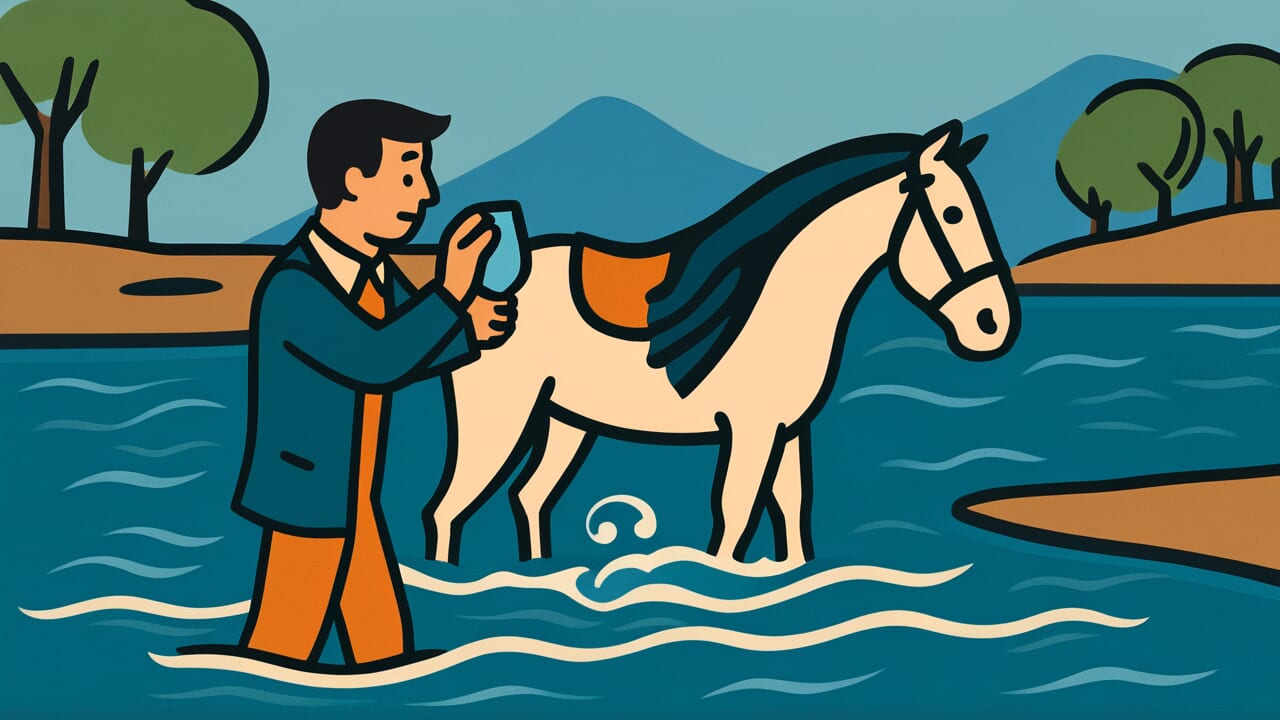How to Read “You can lead a horse to water, but you can’t make it drink”
uma wo mizube ni tsurete ikete mo, mizu wo nomaseru koto wa dekinai
Meaning of “You can lead a horse to water, but you can’t make it drink”
This proverb means that even when you provide an opportunity, you cannot achieve results if the person lacks motivation.
No matter how wonderful the environment or conditions you prepare, nothing will happen if the person has no desire to learn or act.
This saying is often used in educational settings. It describes situations where a teacher may explain things carefully to students, but knowledge won’t stick without the students’ own desire to learn.
In the workplace, a supervisor might give subordinates opportunities to grow. But without the subordinates’ own ambition, growth cannot be expected.
People use this proverb to recognize the limits of changing others. It emphasizes the importance of personal will and initiative.
Today, it represents a philosophy that respects voluntary action rather than forcing things on people.
Origin and Etymology
This proverb is believed to have come to Japan from the English expression “You can lead a horse to water, but you can’t make him drink.”
This saying has been used in English-speaking countries for centuries. Some theories suggest its origins appear in British literature from around the 12th century.
There are interesting reasons why the horse was chosen for this metaphor. Horses have been human partners throughout history, essential for farming and transportation.
However, even as valuable livestock, whether a horse drinks water depends entirely on the horse’s own will. No matter how much humans lead them to water, they won’t drink if they’re not thirsty.
If they feel unwell, they cannot drink. This animal behavior perfectly expresses a deep truth about human society.
In Japan, this proverb was likely introduced after the Meiji period, when Western culture and ideas flowed into the country.
It gained acceptance as a particularly persuasive expression in education and human resource development contexts. The universal theme of the relationship between horses and humans resonated across cultures.
Usage Examples
- Even if you send your child to cram school, you can lead a horse to water, but you can’t make it drink, so it depends on their motivation
- No matter how good an environment you prepare, you can lead a horse to water, but you can’t make it drink, so in the end it’s about your own will
Universal Wisdom
This proverb has been passed down because it touches on a fundamental truth about human growth and change.
When we want to help or guide someone, we often become desperate to arrange the perfect environment. We prepare the best materials, provide the ideal location, and explain things carefully.
However, no matter how perfectly we arrange conditions, nothing begins if the other person’s heart doesn’t move.
This truth reveals something we might call human dignity. People don’t change because someone forces them. They change by their own will.
External influence is merely a trigger. The final decision and action can only come from something that wells up inside the person.
At the same time, this proverb teaches us the limits of those who support others. No matter how much love you pour in, no matter how passionately you reach out, you cannot change another person.
Accepting this fact can be painful sometimes. But knowing this limit actually frees us from helplessness.
Once you’ve done what you can, you trust the other person and wait. That patience may be what true support really means.
This universal wisdom of respecting human free will continues to resonate with people across time.
When AI Hears This
In control theory, the range we can manipulate a system from outside is called “controllability.”
This proverb captures an essential truth: we can actually only control the “input,” not directly control the “output.”
Leading a horse to water is an input to the variable of position. But drinking water as an output goes through multiple internal states.
These include the horse’s thirst detection system, decision-making circuits, and muscle movements. Between input and output exists a “black box” that cannot be seen or touched from outside.
What’s interesting from an engineering perspective is that this black box contains unobservable variables. Is the horse really thirsty? Does it recognize the water? Does it want to drink but feel cautious?
These internal states cannot be measured externally. Control engineering has a principle: variables you cannot observe, you cannot control.
Modern AI development faces the same problem. You can lead AI to the “water” of massive datasets, but whether it truly learns depends on the difficult-to-observe process of updating internal weight parameters.
Education is the same. You can bring students to a classroom and provide the input of lessons, but the output of understanding depends on internal states within students’ brains.
True control of a system requires access rights to its internal states.
Lessons for Today
This proverb teaches modern people a fundamental attitude about relating to others.
When you’re in a position to support someone, know that what you can do extends only to providing opportunities. This isn’t giving up. It’s deep respect for the other person.
As parents, teachers, or supervisors, we tend to demand results. But this proverb teaches us the importance of “the power to wait.”
Once you plant a seed, you can only wait for it to sprout. If you dig up the soil impatiently, you’ll actually hinder its growth.
At the same time, this proverb carries an important message for yourself. In your life, how you use opportunities that someone prepared for you is up to you.
Blaming your environment is easy. But ultimately, you’re the one who takes action.
If someone brought you to the water, responding to that kindness is also your choice. This realization becomes the first step toward true independence.



Comments